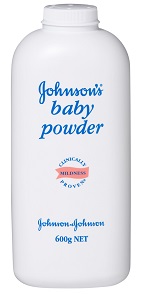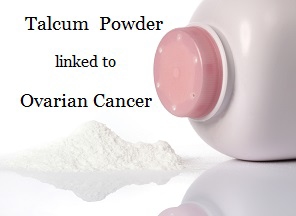 A woman who used Johnson & Johnson baby powder on her genitals and then developed ovarian cancer urged a Missouri jury on Oct. 4, 2016 to find J&J liable. In opening statement, her lawyer said J&J has known for years about a talc-based baby powder cancer link but failed to warn people about it. All talcum powder cancer lawsuits charge that J&J failed to warn of a talc-cancer link.
A woman who used Johnson & Johnson baby powder on her genitals and then developed ovarian cancer urged a Missouri jury on Oct. 4, 2016 to find J&J liable. In opening statement, her lawyer said J&J has known for years about a talc-based baby powder cancer link but failed to warn people about it. All talcum powder cancer lawsuits charge that J&J failed to warn of a talc-cancer link.J&J prepared Defense Early
During opening arguments in St. Louis, Deborah Giannecchini’s attorney said J&J’s own inside documents showed the company anticipated the talc-cancer litigation to the point of writing out “a question and answer” to prepare for questions from plaintiffs’ attorneys who would sue J&J for women’s ovarian cancer cases. Another internal document feared the company would be compared to the cigarette industry if it failed to warn of the ovarian cancer link with talc powder. The attorney said J&J had been urged since at least 1982 to add warning labels to its talc-based baby powder.
Stage 4 Ovarian Cancer
Ms. Giannecchini has Stage 4 ovarian cancer, her lawyer told jurors, complications from her treatment, a greatly reduced life expectancy.
The attorney said the woman has had her spleen removed, along with part of her stomach and colon, and all of her ovaries and uterus.
Failure to Warn Key
A failure to warn is the legal terminology which sets the bar a plaintiff’s attorney must meet in order to make a case of this nature. The plaintiff’s attorney must not only prove a talc-cancer link, but also show that the company failed to warn of it. Her attorney argued: “[Ms. Giannecchini] said if there would have been a warning on the bottle to not use this on the genital area, she would not have done it and we might not be here.”
Defense Opening
J&J’s attorney argued in opening statement that there is no solid link between talc and ovarian cancer. He said the U.S. FDA and CDC were among “trusted medical institutions” that looked for a potential link but found none. “No one knows what causes ovarian cancer,” the attorney argued.
Imerys Talc America Inc., another defendant, which mines talc for J&J, repeated J&J’s contention that talc is not linked to cancer. Imerys’ attorney added that Imerys did not market the baby powder used by Mrs. Giannecchini, but simply provided the materials used to make it.
Plaintiffs 3-0 against J&J in Talc Cases
Ms. Giannecchini’s trial follows two huge verdicts against J&J in similar cases in 2016.
In February, a Missouri jury rendered a $72 million verdict to the family of Jacqueline Fox. Ms. Fox died of ovarian cancer after using talc-based powder for decades. It was the first case in which J&J was ordered to pay damages over a talc-cancer link tied to its products.
The Fox family verdict involved $10 million in compensatory damages, $62 million in punitive damages, which are assessed by a jury when it is outraged and wants to send a message to a company it deems has done wrong.
In another J&J loss, in May 2016, a Missouri jury shocked the company with a $55 million verdict in a lawsuit brought by Gloria Ristesund.
J&J also lost a third jury trial, the first ovarian cancer-talc case to go to a jury, in 2013. In that one, a South Dakota jury ruled that J&J had failed to warn a woman about the link between talc-based powders and ovarian cancer. In that case, however, the woman’s cancer had been in remission for six years, though ovarian cancer is usually fatal. The fact that she was apparently recovered, according to legal experts, may have kept the jury from awarding damages despite its ruling that the company failed to warn of a talc-ovarian-cancer link. South Dakota, however, is a staunchly conservative state, which might give J&J pause in considering how long to fight talc cases before coming to the settlement table.
Baby Powder Cancer Risks hidden, Jury told
The case is Giannecchini v. Johnson & Johnson et al., case number 1422-CC09012-01, in the 22nd Judicial Circuit Court of the State of Missouri.
Related
- J&J Knew Talc-Ovarian Cancer Risk
- Talcum Powder Cancer Lawsuit
- Talcum Powder Cancer Attorney
- J&J Baby Powder Propaganda
- $72 Million Talc Cancer Verdict
- Talc Cancer Verdict: $55 Million

by Matthews & Associates




